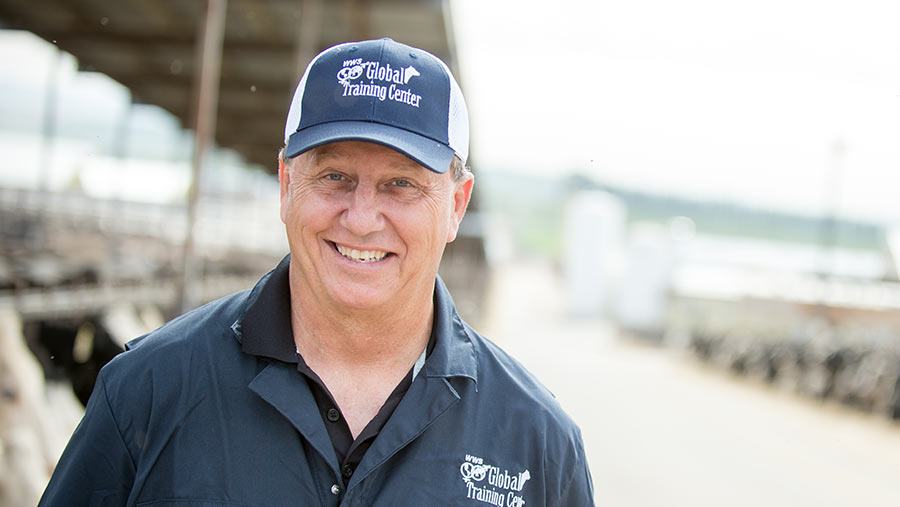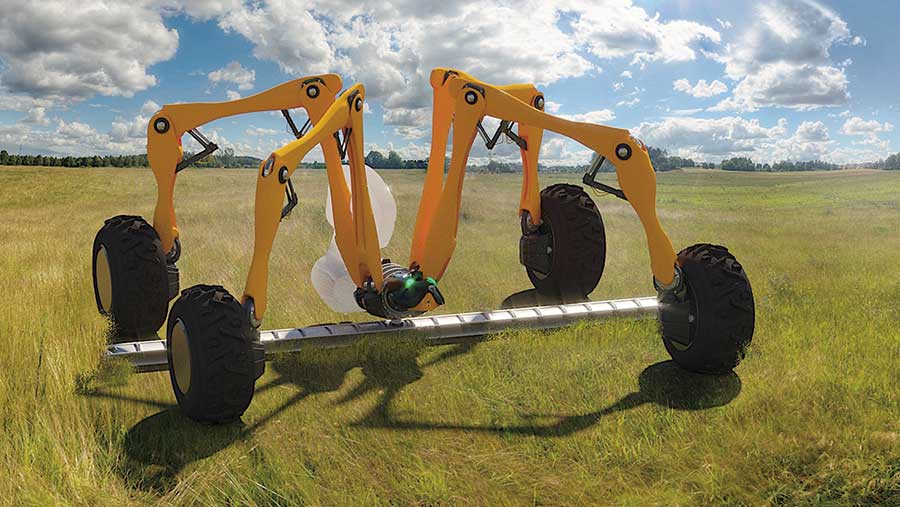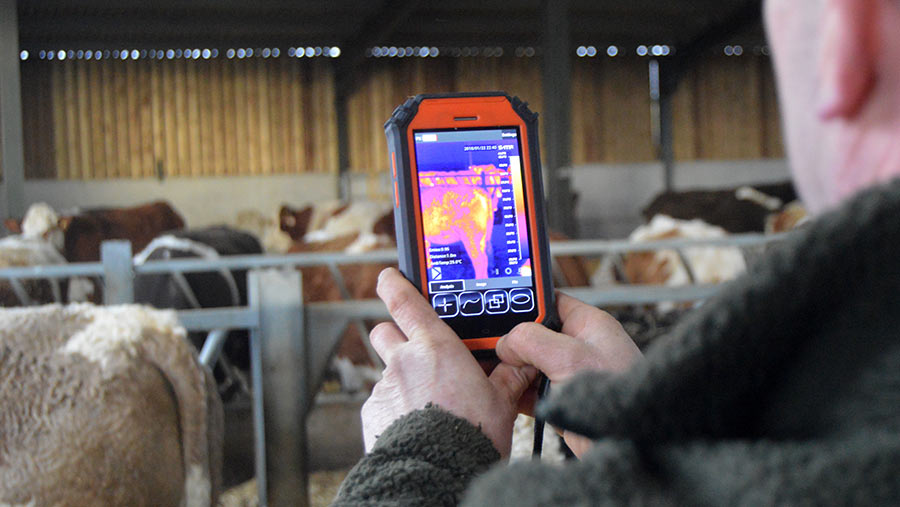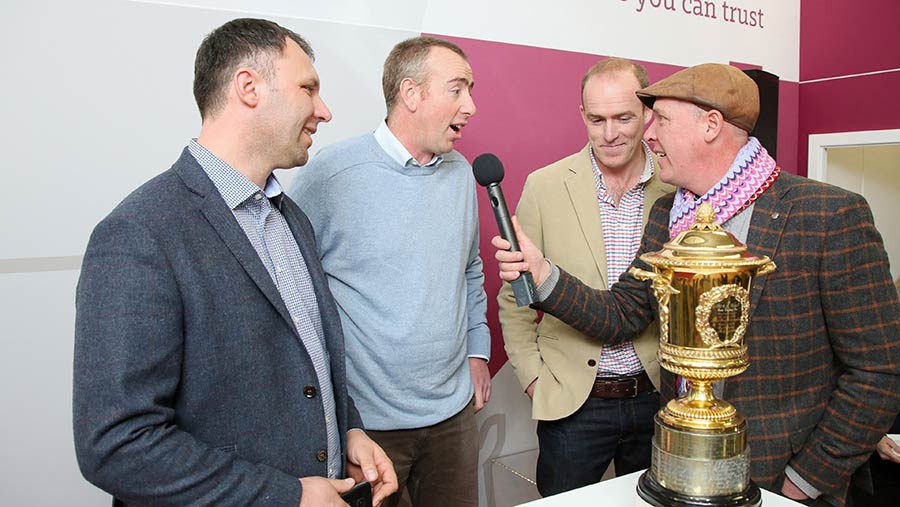What not to miss at Dairy-Tech 2019
Weed-killing robots, advanced disease detection and state-of-the-art machinery simulators are just some of the must-sees at Dairy-Tech 2019.
The Royal Association of British Dairy Farmers’ (RABDF) event returns to Stoneleigh Park, Warwickshire, on 6 February after a hugely successful inaugural year.
Event details
- Date: 6 February 2019
- Time: 8am-5:30pm
- Venue: Stoneleigh Park, Warwickshire CV8 2LZ
- Tickets: Free for RABDF members. Otherwise £17 when booked in advance and £20 on the gate. Under-16s go free but proof of age is required.
- Contact: office@rabdf.co.uk or 02476 639 317
RABDF managing director Matt Knight said feedback from last year’s 5,000 visitors showed 90% planned to return in 2019.
Mr Knight said the event, which was specifically devised to focus on technology, innovation and science, had drawn 282 exhibitors, 76 speakers and 52 new products this year.
See also: 9 new products to be showcased at Dairy-Tech 2019
He said the aim is to provide a platform for new thinking and consider how it could be adopted to make British dairy farms more competitive and sustainable for the future.
As well as ground-breaking concepts from virtual reality to revolutionary labelling and robots, visitors will be able to hear from experts on a range of topics, including Ian Potter on volatility, risk mitigation and dairy contracts.
To ensure no practical elements are missed, hoof-trimming demonstrations will take place and, for the first time, there will be a demonstration of thermal imaging and its role in detecting lameness.
With so much on offer here are just some of the must sees.
Dairy-Tech 2019
Dairy-Tech is divided into key areas:
- Science, technology and innovation – featured in the Innovation Hub and Tech Zone
- Business efficiencies – based in the Dairy Hub, focusing on the key elements required to run a business
- Practical solutions – featuring several demonstrations, including thermal imaging. The outside area will be showcasing machinery and equipment
Dairy Hub must-sees
Call for staff management training
Less than 3% of young farmers are trained in managing staff, according to survey results that will be shared at the event.
Dairy consultants Kite and event organiser RABDF surveyed 70 dairy farmworkers aged between 20 and 35.
They found that while a significant number of young people were involved in managing staff on farms, only two respondents had formal training to help them undertake the task.
Kite consultant John Allen (pictured below) will tell event visitors that while it is good news that young farmers want to progress into management, more needs to be done by the wider industry to support them with formal training.
Mr Allen and RABDF policy director Tim Brigstocke will be divulging the full results of the survey at 10.15am in the Dairy Hub zone.
They will also be giving managers advice on the types of formal training that should be carried out on farms.
Visit the Dairy Hub at 10.15am to hear more on Mr Allen’s views
Is early VWP losing UK dairy farms money?
UK dairy producers will be challenged to consider if they are breeding cows at the right time by US-based Dr Scott Abbott (pictured below), from Dairy Vet Management and director of technical services at breeding company World Wide Sires.

Alongside vet Dr John Cook, from World Wide Sires UK, he has examined data from good-performing UK herds that suggests voluntary waiting periods (VWP) – the interval postpartum when producers refrain from breeding cows – could be too short on UK farms.
Dr Abbott has studied anecdotal data from 4,000 cows across 16 high-production herds.
It showed that cows that become pregnant before 70 days in first lactation had reduced milk production in both first and second lactation, as well as a higher culling rate.
He will explain that farmers assume that if a cow is pregnant early, she must be healthy.
But he will reveal that animals bred early in first lactation actually had higher culling rates in their second lactation.
Further data from another 10,000 animals analysed by Dr Cook will demonstrate that cows which conceived early in first lactation had a higher culling rate in the first 100 days of second lactation.
Dr Abbott’s theory is that early pregnancy in first lactation impacts peak milk yield at 80-90 days as a result of a hormone shift.
By second lactation, full milk potential is not reached because animals get pregnant too quickly and are not able to re-build body condition after second calving.
The findings are consistent with high-production herds Dr Abbott visits worldwide and he believes dairymen are breeding first-lactation animals too early.
Instead they should consider the benefits of extending their VWP to between 50-70 days and review their own herd data to see where economical potential is being lost.
To hear Dr Abbott speak, head to the Dairy Hub at 12.20pm.
Skills Studio must-sees
Meet key contacts and polish your CV
New for Dairy-Tech 2019, the Skills Studio is aimed at students, new entrants and those looking to develop their skills.
There will be a drop-in CV clinic, a jobs board and information about study tours, ag courses and apprenticeships as well as the presentation of a number of RABDF student awards.
Key contacts from the whole supply chain will also be available to answer questions and talk business.
Sessions start at 9am.
Innovation Hub must-sees
Machinery training simulators
Learning to use high-tech machinery in an advanced simulator is no longer the preserve of the aircraft sector.
Tenstar Simulation will demonstrate its virtual reality capable simulators, which mimic real cab environments that are linked to high-resolution screens.
Tenstar Simulation’s Simon Hogg said the technology allows students to familiarise themselves with modern tractors, combines and loaders in a safe environment.
The sophisticated software provides typical situations for the trainee operator to tackle without risking expensive kit.
Analytics and feedback scores on how the operator has performed also aid development.
The main UK agriculture colleges are already adopting the technology.
Mr Hogg will be speaking at 2pm.
Weed-killing robots
Robots using electricity and lasers to destroy weeds may sound like science fiction but one agri-tech company is already making rapid progress towards that goal.
The Small Robot Company (SRC) is a group of farmers, engineers, scientists and service designers with a deep knowledge of farming, robotics, artificial intelligence and service design.
The company is dedicated to finding ways to create a more sustainable farming model, with less dependence on inputs and more outputs
Co-founder Ben Scott-Robinson will explain how the company’s non-chemical weeder will operate, using artificial intelligence to seek out and destroy weeds in pastureland.
Nicknamed Dick, the machine is part of a wider family of robots – Harry, Tom and Wilma.

Mr Scott-Robinson will showcase the robot family and demonstrate how his company aims to digitise farming, making it more profitable, more efficient and more productive.
Hear Mr Scott-Robinson at 10.20am in the Innovation Hub
Practical solutions must-sees
Thermal imaging lameness detection
Thermal imaging cameras can detect lameness problems in hips, shoulders and feet, days or even weeks before a cow shows signs of discomfort.
Miracle-Tech’s George Coles will carry out live demonstrations of the technology at Dairy-Tech using a handheld imager on cows, with results displayed on a monitor.

Mr Coles will explain that most things emit infrared radiation, which is directly affected by heat – the higher the temperature, the greater the amount of radiation.
The different intensities are picked up by the camera and translated into a thermal image.
If an animal has an injury or site of infection, it will clearly show up as small hotspots on the screen.
This allows the animals to be treated accordingly far earlier and means that the correct treatment or medicine is used, potentially lowering antibiotic usage.
See also: Thermal imaging cuts antibiotics use on Northants beef farm
Award winners must-sees
Gold Cup
The prestigious NMR/RABDF Gold Cup competition will reach its climax on the NMR stand with the presentation to the winning farm business.

The shortlisted six include five Holstein herds and one crossbred herd from farms across Scotland, England and Northern Ireland.
The finalists are:
- The Harvey family, Beeswing, Dumfries
- James and Eleanor Tomlinson, Preston, Lancashire
- Tom and Karen Halton, Congleton, Cheshire
- Metcalfe Farms, Leyburn, North Yorkshire
- Stephen and Mark Montgomery, Drumahoe, County Londonderry
- Stowell Farms, Marlborough, Wiltshire
See also: James and Eleanor Tomlinson are the Farmers Weekly 2018 Dairy Farmers of the Year.
The Royal Dairy Innovation Award
The award recognises the most practical, relevant product or service that is, or likely to be, the most significant innovation for the future of dairying from a Dairy-Tech 2019 exhibitor.
Three companies make up the shortlist:
- PBD Biotech – Actiphage rapid blood test for bovine TB and Johne’s disease
- ARK Agriculture – high-quality, high-visibility work shirts to replace reflective vests
- Pruex – non-infective bacterial spray for calf and cow bedding that eliminates ammonia-producing bugs
Winners will be announced at 3.50pm in the Innovation Hub
Personalised Itinerary Service and Dairy Pro Points
- Seminars and workshops at Dairy-Tech are eligible for Dairy Pro points.
- Registered Dairy Pro members can collect points, which will be recorded against their personal and business profiles.
- To become a member, register at the AHDB stand.
- All pre-bought tickets are eligible for Dairy-Tech’s personalised itinerary service.
- The itineraries are in place to ensure visitors use their time efficiently and earmark relevant seminars and exhibitors.
- Itineraries will be emailed out ahead of the event. Register by 29 January.
See the full agendas on the Dairy-Tech website for the Dairy Hub and the Innovation Hub.
